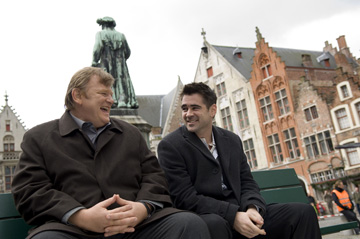IN BRUGES

Reviewed by Sam Hatch
In Bruges is a witty gangster dramedy from Oscar winning short director Martin McDonagh. It shares numerous elements with the “cinema of cool” work of both Quentin Tarantino and Guy Ritchie, but earns points for developing its own style along the way. There are countless Tarantinoid ripoffs out there, peddling quirky tales of hipster killers that philosophize as they terrorize, though many of them fail miserably at finding any heart amidst their Kitsch n' Kill miasma.
McDonagh scores on that count, for while Colin Farrell's troubled hitman Ray is certainly guilty of running off at the mouth and brain, he's also traumatized and troubled at his core. In his case, much of his apathy and sardonic wit is mere bluster disguising an inner turmoil that threatens to topple his will to live. Vincent Vega never put a gun to his head and pondered pulling the trigger.
Ray's partner in crime (and forced leisure) is Brendan Gleeson's paternal figure Ken, who feels personally responsible for referring the young man into this grisly racket. Their exile in Bruges (pronounced ‘Broojh') is the result of a naff hit in London, the exact details of which are carefully hid from us until halfway through the film. Their underworld overlord is a mysterious voice on the phone named Harry (Ralph Fiennes), whose genial behavior is routinely punctuated by comical bursts of rage-fueled profanity.
Harry's under the misconception that this Belgian “vacation” will somehow serve as a soothing balm to the troubled mind of Ray. In actuality the prickly youth is perpetually tormented by his alien surroundings. The medieval buildings of Bruges become a physical commentary on Ray's ailing state of mind, and are further accented by a running subtext of infernally surreal imagery from the work of Dutch painter Hieronymous Bosch.
The tortured souls found in that man's paintings are later forged into literal form during the late night shooting of a film-within-this-film. This movie shooting on the streets of Bruges is the only source of excitement for the terminally bored Ray, and it leads him to disobey the orders from on high demanding he stay put in the hotel at night. His curiosity leads him into the acquaintance of a mysterious young girl named Chloë (Clémence Poésy), who may or may not be a drug dealer. Ray's semi-honest dalliance with this woman also reminded me of the wry balancing of humor and pathos found in John Cusack's Grosse Pointe Blank.
Ray is also simultaneously drawn toward and repulsed by one of the film's stars, a taciturn little person named Jimmy (Jordan Prentice – the giant bag of weed from Harold and Kumar!) who becomes a loudmouthed racist when under the influence of cocaine. The relationships Ray and Ken develop with these people are seemingly unimportant deviations that nonetheless advance the plot in an ambling fashion. There's nothing quite as outrageous as any of the numerous twists of fate in Pulp Fiction, but they add to the dreamlike nature of the film as a whole.
Bruges as a waking dream is a metaphor employed by Harry, who chose the destination based upon his own infatuation with it. Eventually, as one character fails to do his subsequent job, Harry is forced to travel there himself to set things right (or perhaps wrong). Fiennes looks almost as diabolical as his Potter series incarnation of Lord Voldemort, despite the fact that he sports no grotesque makeup here.
Farrell skillfully delivers this layered role, and for all of Ray's adult travails during this excursion he often comes off as a precocious child (scuffing his feet impatiently while Ken enjoys the Basilica of the Holy Blood). This is a nuanced counterpoint to the fact that his soul is wounded by the memory of what befell another innocent youth in the name of petty criminalism.
The cinematography by Eigil Bryld is another major victory, delivering stunning imagery of ancient buildings and winding canals steaming with an ominous mist. There's also a great gunfight set against a gorgeous nighttime snowstorm, that evokes feelings of serene wonder while concurrently quickening your pulse. More points go to the interesting score by Carter Burwell.
While this may not be everyone's cup of arsenic, I was taken in by the honesty and humanity of its characters. The trailers were promising another trite, lighthearted gangster romp, but I was pleased to find a pitch black crime comedy that was also occasionally heartbreaking and sincere. It's one of those movies that would be perfect to lose yourself in during a screening at two in the morning. If this sort of weird concoction is to your liking, you just might enjoy your stay In Bruges as much as I did.